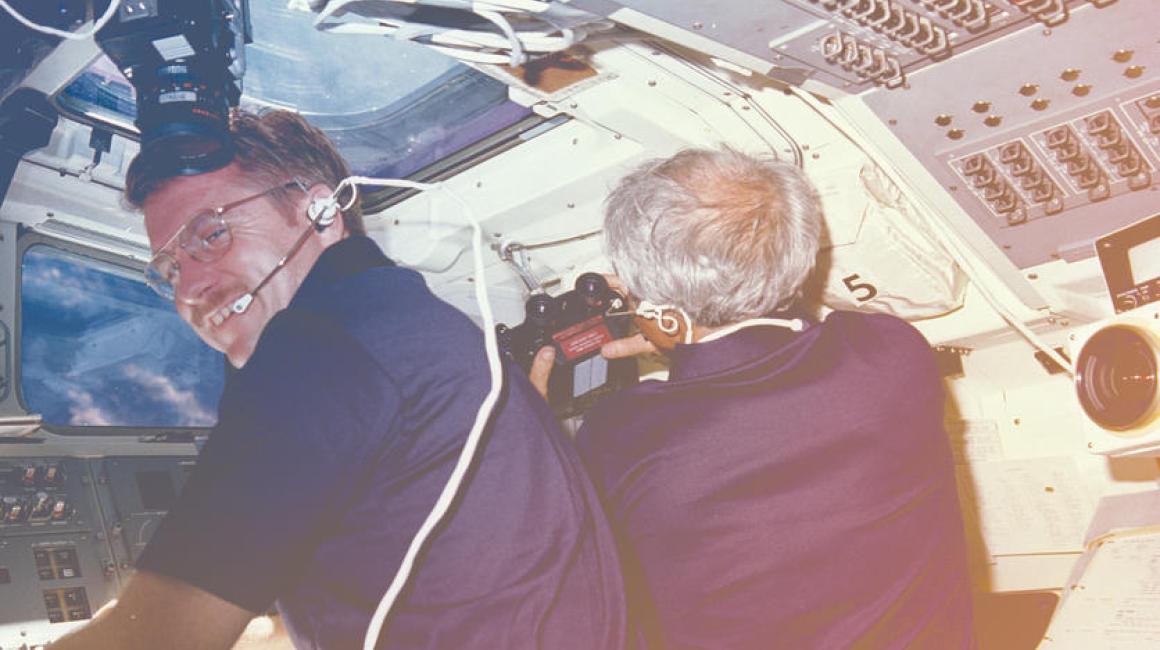
It was also something of an existential awakening — the moment, according to Tony England, former astronaut and current dean of the College of Engineering and Computer Science, that the idea of humans living on other worlds suddenly didn’t feel so impossible. Ahead of the 50th anniversary of the historic Apollo 11 mission, we chatted with England, who worked on two Apollo missions and flew on Space Shuttle Challenger, about how traveling in space personally changed him — and why it continues to hold a grip on our collective imagination.
Legacy: So a lot of people on campus seem to know that you were an astronaut, but that’s also about all we know. Would you say that’s true?
Tony England: It’s definitely true. I often feel a bit awkward talking about it. It’s not that I mind reminiscing, but I don’t know what people want to hear and I don’t want to bore them with stuff they’re not interested in. If people are young, of course, they always want to know how you go to the bathroom in space. Or they’re really interested in what it’s like to feel as if you’re floating. But what’s interesting to me is the question you almost never get asked. And that is, why do we do it?
L: You mean, what’s driven us to explore space in the first place?
TE: Exactly. Back in the Apollo era, it was really a defense issue. The Russians launched Sputnik in 1957, and really throughout the 1950s, the public saw that the Russians were developing launch vehicles that were at least capable of carrying a weapon. It was far beyond what we were doing at the time. So our challenge then was assuring that we had the technology to be leaders — or at least survivors. That’s ultimately why we went to the moon. But the question that intrigues me now is, absent some of those issues, why have we continued to do these things?
"What’s interesting to me is the question you almost never get asked: Why do we do it?"
L: And what are your thoughts about that?
TE: Well, there is a solid scientific argument: Everything we’ve learned about how the Earth fits into the solar system and the universe in general has clearly changed our thinking about ourselves and our place in the universe. But for human space flight, specifically, I think why we’re doing it is rooted in the question of whether humans have a future beyond the Earth. We are natural explorers, and if it’s possible and it’s interesting, we’ll want to try it. Mars and some of the moons of the outer planets are very interesting places, and it’s inevitable that we will want to try to reach them.
One of the things I felt after my eight days up there, is that I was very comfortable. I was even sorry to have to come back down. For the first time, I had the feeling that this might be made to work. That is, I went up thinking of going to space more like it was going to the bottom of the ocean: We could arrange it, but I was acutely aware of all the things that needed to be managed for survival, and you certainly wouldn’t want to build a town down there. We already knew, for example, that people lost bone mass the longer they were in space. Your cardiovascular system suffers in a microgravity environment. Your immune system gradually loses its potency because you’re not exposed to germs. Still, the experience of being there was so surprisingly comfortable that I began to feel that, although I didn’t know how we would do it, we would ultimately find a solution. I came away believing that human space flight was really most profoundly an experiment on the human body.
L: And have we made progress on those challenges, where humans could physically adapt to living somewhere other than Earth?
TE: I think we were beginning to address some of those issues with the Space Station. But that is not the priority today. There are other interesting issues emerging that may help us get back there. Through NASA partnerships with private companies and through more international competition, we’re finding less expensive ways to get to orbit. Even new technologies like drones or autonomous vehicles — things that are being talked about in the context of urban travel — I could see those becoming a way that individuals can fly reasonable distances, in an automated environment. I think the same thing will happen with getting to orbit. Initially, it will be very expensive and may even cater to tourists. Perhaps it will be an orbiting resort, where people go up there and stay for a few weeks. Or maybe a resort on Mars. But I don’t think it’s far fetched to say that day is coming.



